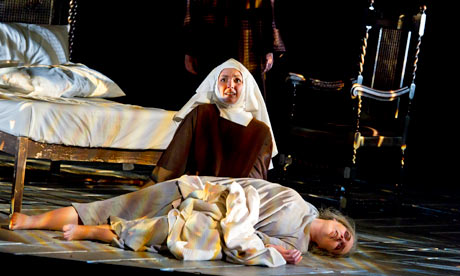
"Blanche was me and she still is," Poulenc used to say of the stricken nun-heroine in his opera, Dialogues des Carmélites. This 1957 work, a mix of French religiosity and reign-of-Terror fear, has that air of a florist's packed with funeral lilies: exquisite, heady and burdened with mortality. The music, tonal and melodious, is usually summed up as "voluptuous", but this conveys nothing of the erratic harmonies and shards of dissonance which characterise the score. It was the rewarding if difficult choice for Guildhall School of Music & Drama's mid-year opera production.
Some two dozen singers and four repetiteurs are accepted on the school's elite opera course under the direction of Clive Timms, who also conducted. Opera professionals – here director Stephen Barlow making his GSMD debut after working at such illustrious venues as the New York Met and our own incomparable Opera Holland Park – have raised standards from reliable but studentish to, at least vocally and on occasion, very near professional. David Farley's designs, a series of tableaux using a revolve and a semi-mirrored floor encased behind a jagged, broken-glass "window" – a constant visual theme – were stylish and effective.
Let's not dwell on the seriously rickety orchestral playing (strings aside) which lacked even a hint of the finesse the outstanding principal singers brought to their roles. It was their night. The hugely talented Anna Patalong (Blanche), Sophie Junker (Constance) and Sylvie Bedouelle (Mother Marie) led the admirable ensemble. We knew each of these nuns, from the sparklingly innocent novice Constance to the dying Prioress, whose crisis of faith and fury were powerfully conveyed with striking maturity by Cátia Moreso. The Australian Barlow (not to be confused with the established British opera conductor Stephen Barlow) wisely stuck to the Revolutionary period, with no clever tricks. Only the final walk to the scaffold, done only by spotlighting each martyr, was a letdown. Catch performances tomorrow and Wednesday. This is a show packed with talent.
Conservatoire standards ebb and flow but ambitions are high right now. The Royal Academy of Music, with its own strong opera department directed by Jane Glover, has commissioned (with the Juilliard School, New York) a work from Peter Maxwell Davies, rebel, master of the Queen's music and royal wedding composer. Kommilitonen! (Young Blood!), to a libretto by David Pountney, is about youth protest. The world premiere is on 18 March, a major event. So much depends on the quality of staff, and their ability to forge links with the music world at large. Nothing happens by chance.
The Royal College of Music proved this last week, where no less a luminary than Bernard Haitink, who was 82 on Friday, conducted the college orchestra in that monstrous showpiece, Strauss's Alpine Symphony. Haitink's long association with the RCM was sparked by the head of woodwind, Simon Channing, who was flautist and chairman of the LPO where Haitink was principal conductor in the 1970s. Haitink particularly enjoys working with students on large-scale works – symphonies by Bruckner in 2005 and 2006 – but he had to cancel his last stint owing to illness.
Miraculously, he is back at work and on energetic form. The RCM concert hall has a lively acoustic and the roar at climactic moments was ear-blasting and exhilarating. Strauss's scoring, which includes an array of horns onstage and off, Wagner tubas, cowbells and wind machine, makes the most of freely available student forces. They were formidable, their enthusiasm for Haitink heartwarming. Other RCM regulars, reflecting close ties with the Philharmonia as well as the LPO, include Esa-Pekka Salonen and Vladimir Jurowski. This is superb training for future orchestral musicians.
Many conservatoire events are free and open to all. It's a chance to try out repertoire you might normally resist. Manchester's Royal Northern College of Music hosted a Brian Ferneyhough day on Monday, snapping up the composer straight from his successful Total Immersion at the Barbican on Saturday. Only able to be partly immersed, and in London, I had to satisfy myself with the Quatour Diotima's outstanding lunchtime recital.
Claiming a soft spot for Ferneyhough (b 1943), the so-called father of New Complexity, could sound like boasting an enthusiasm for nettles. Yet his gift for microscopic aural detail is beguiling and, yes, approachable. The Diotimas played the short, dense Second String Quartet (1980) and the expansive Sonatas for String Quartet (1967), written when Ferneyhough was still studying at the Royal Academy of Music. It makes severe demands on players, but the results are supremely delicate. It's "basically fungible", Ferneyhough remarked cheerily by way of introduction, as if that sorts out its mysterious 24-part structure once and for all. Sometimes it's safer to let the music speak. It did.

